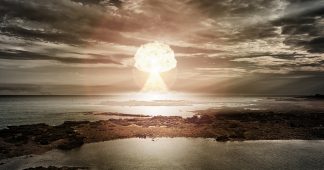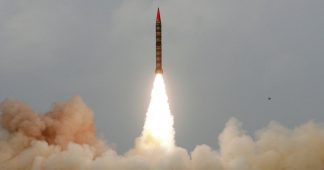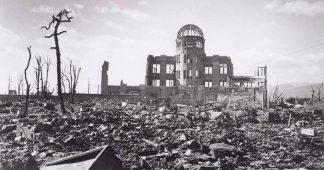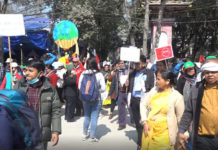Study: Two Billion Could Starve in Event of ‘Limited’ Nuclear War
December 10, 2013
The Atomic Bomb Dome is seen in silhouette during sunset over the Peace Memorial Park in Hiroshima on Aug. 5, the eve of the 68th anniversary of the U.S. atomic bombing of the Japanese city. A new report warns that a “limited” nuclear conflict using 100 times the atomic firepower of the attack on Hiroshima could cause worldwide famine (Toru Yamanaka/AFP/Getty Images).
WASHINGTON — A hypothetical nuclear war in South Asia could trigger worldwide famine and “probably cause the end modern industrial civilization as we know it,” the lead author of a new report tells Global Security Newswire.
Published by the watchdog group Physicians for Social Responsibility, the report, titled “Nuclear Famine: Two Billion People at Risk,” updates prior studies on the potential impacts that a “limited” nuclear war between India and Pakistan could have on the global climate, and consequently on food supplies.
The prior research, published in 2012, predicted that corn and soybean production in the United States would decline 10 percent on average for 10 years. It also projected a decline in Chinese middle-season rice production — on average by 21 percent during the first four years and on average 10 percent in the following six.
At the time, Physicians for Social Responsibility said these effects could “put more than one billion people at risk of starvation.” The new forecast released on Tuesday indicates the number of people at risk of starvation would actually be double that figure, the group says.
The fresh analysis includes a study completed this fall showing there could be even larger drops in Chinese winter wheat production. These crops could decline by 50 percent during the first year and by more than 30 percent over 10 years.
Increasing prices would exacerbate the shortage of available food, according to the report, which goes on to call for the elimination of nuclear weapons “as quickly as possible.”
“Significant, sustained agricultural shortfalls over an extended period would almost certainly lead to panic and hoarding on an international scale as food exporting nations suspended exports in order to assure adequate food supplies for their own populations,” the report says. “This turmoil in the agricultural markets would further reduce accessible food.”
Ira Helfand, a medical doctor from Northampton, Mass., who served as the lead author of the report, told GSN the data shows that the equivalent of 100 Hiroshima-size bombs could “probably cause the end modern industrial civilization as we know it.”
A conflict of this size would represent the use of about half the nuclear arsenals that India and Pakistan possess, or a “tiny portion” of the U.S. and Russian stockpiles, according to Helfand.
“This is an unbelievably huge shock to the international system,” Helfand said. “We saw what happened to the world’s economy when the housing bubble collapsed in the United States — [here] we’re talking about a shock to the international economic-social system orders of magnitude larger than that. I think it’s quite hard to imagine how this much-more-fragile-than-we’d-like-to-think system can survive that.”
According to Helfand, the chain of events that would lead to such catastrophe is as follows:
Firestorms caused by nuclear detonations would launch more than 6 million metric tons of soot into the Earth’s atmosphere — blocking out sunlight and causing a sort of global cooling effect commonly referred to as “nuclear winter.”
The cooling and other anticipated climatological impacts — such as decreased precipitation — substantially reduce crop yields, which in turn causes disrupted markets and famine.
“Even a limited use of nuclear weapons essentially is an act of suicide,” Helfand said. “These weapons simply have to be understood to be completely useless. From the U.S. perspective, if we were to use even a tiny fraction of our own arsenal against an adversary on the other side of the planet, we would end up causing this global catastrophe that would have terrible repercussions here at home.”
Helfand argued that, in light of such information, President Obama and other world leaders are not pursuing aggressively enough efforts to reduce and eliminate nuclear arms.
“There is this notion at the moment in policy circles that we don’t really have to worry about nuclear war — just nuclear terrorism because the U.S. and Russia are never going to fight a war,” Helfand said. “I don’t know where they get that sense of confidence from — I certainly don’t have it watching the jockeying between the U.S. and Russia over the last year and knowing how many times we have stumbled accidentally into near-disaster situations even after the end of the Cold War.”
Efforts the Obama administration has made toward arms reductions have been heavily criticized by congressional Republicans, who fear that the president might pursue additional reductions unilaterally — without reciprocal cuts by Russia — despite the administration’s assertions to the contrary.
Rose Gottemoeller, Obama’s nominee to be undersecretary of State for arms control and international security, faced sharp questions on this topic during her confirmation hearing in September. Gottemoeller said “unilateral reductions are not on the table,” a response that did not satisfy some Republican senators.
The Senate Foreign Relations Committee voted to approve Gottemoeller’s nomination, but her confirmation has yet to be taken up on the Senate floor.
Published in www.nti.org











